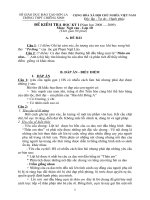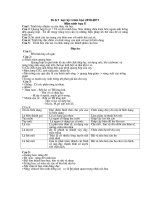Đề thi giữa kì+ đáp án môn đầu tư tài chính
Bạn đang xem bản rút gọn của tài liệu. Xem và tải ngay bản đầy đủ của tài liệu tại đây (215.54 KB, 4 trang )
MIDTERM TEST
FINANCIAL INVESTMENT
PART 1
1D
Default risk is the risk that a lender takes on in the chance that a borrower
will be unable to make the required payments on their debt obligation. A
higher level of default risk leads to a higher required return, and in turn, a
higher interest rate.
2C
P/E ratio = (Market price) ÷ (earning per share)
19 = ($65.20) ÷ (earning per share)
So, the earning per share is 3.4315
The earning per shares = (Net income) ÷ (Number of outstanding shares)
3.4315 = (Net income) ÷ (42,000 shares)
So, the net income is $144,126
3A
Stocks are an direct investment representing ownership of a business
4C
Market capitalization= No of shares × price per share
= 2000000
×
$25
=
$50000000
5D
Debt represents funds loaned in exchange for interest income and the
repayment of the loan principal.
When someone or an institution owe a debt it means that they have a
obligation to repayment the principle loan plus the interest income.
6D
Stocks and bonds are traded in capital markets.
After being initially issued, bonds and stocks then trade in secondary
markets. However, there is a key difference between how stocks and
bonds are traded on secondary markets: stocks are traded on exchanges
while bonds are traded over the counter.
7B
Bonds are least likely to be called if they are selling at a substantial
discount.
If bonds are selling at a substantial discount it means the company have
to pay more and more coupon to the buyers so company are least likely
to call bond in this case.
8D
As a general rule, book values are usually below market values.
When the market value is less than book value, the market doesn't believe
the company is worth the value on its books. A higher market value than
book value means the market is assigning a high value to the company
due to expected earnings increases.
9D
Sales two years from now:
= Sales in year 0 × (1 + Growth of year 1) × (1 + Growth of year 2)
= $350,000 × (1 + 5%) × (1 + 5%)
= $350,000 × 1.05 × 1.05
= $385,875
Profit margin = 6% of sales two years from now
= 0.06 × $385,875
= $23,153
10C
The first public sale of a company's stock is called an IPO.
An initial public offering (IPO) refers to the process of offering shares of
a private corporation to the public in a new stock issuance. An IPO allows
a company to raise capital from public investors.
PART 2
Birth month: May
1.The stock market is filled with individuals who know the price of
everything, but the value of nothing
This is a very popular quote for people to know about securities or
investing in general. The well known of its come from a truth that investors
often suppose the stocks are true value correlate with their price (market
value), but this isn't always the case. The market can price securities
incorrectly. Although a stock appears to be a bargain due to its low price,
it may not be a good value. In other word, people usually care about the
price to pay for that stock but most of them can't evaluate a stock is
underpriced or overpriced. Thus, you should consider very carefully the
real value of a stock before decide to pay. Going beyond investing area,
this word can be applied in lots of other field. For example, one of my
experience in a grocery store I was making the choice between a
deliciously unhealthy snack and a more healthy vegetable. In the end, the
lower price made me choose the healthy option due to i just have a little
money at that time. In this case we can realize that the price was higher
on the far less valuable food. In conclusion, let’s try to distinguish the price
from the truly valuable and make careful decisions that will lead to the
better outcome not only for our portfolio investment, but for our lives
because price is what you pay; value is what you get.
2. How has the spread of Covid-19 affected your life and the way you
manage your wealth? What should you do to maintain and increase
your wealth in the“new normal”?
The spread of Covid-19 has greatly affected my life and how i manage
my wealth. Specifically, it has been more than 6 months that I have not
been able to go to school due to the pandemic. Online learning makes
acquiring knowledge more difficult than before. Furthermore, I must wear
a mask when talking with others and i also have to adopt with staying at
home in a long period of time. So, my plant to increase my wealth in these
days have been stagnant so far. I have to quit my part-time job, also
tighten my belt and my securities investment have been dropped
significantly. Fortunately, the epidemic was well controlled, many people
have injected the vaccine so i can resume my plant in once day. In "new
normal" situation, i will try to find a new job and make a significant attempt
to improve my score at university. Also, when the life becomes normal,
the security market will raise correspondently. It's a great oppotunity for
me to invest in stocks that are on the rise and improve my portfolio. In
conclusion, my wealth plant can be enhance soon in this "new normal"
situation.









